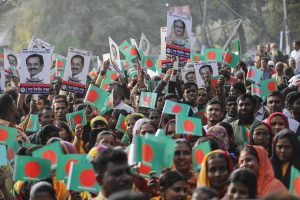In the wake of an unprecedentedly massive Gen Z uprising, Bangladesh’s Prime Minister Sheikh Hasina resigned and fled to India on August 5.
In interviews with several media outlets including BBC World Service and India Today afterwards, Hasina’s son Sajeeb Wazed Joy confirmed that Hasina, age 77, is never coming back to politics.
Although it is still early days, this series of events suggests that the Awami League (AL), a party once spearheaded by Hasina’s late father and the nation’s founder, Sheikh Mujibur Rahman, may face a prolonged period of political bankruptcy.
Initial reactions from the top leaders and ministers of the AL indicate that they “feel betrayed by Hasina’s sudden departure,” especially since she left them and the party’s activists to confront the protesters alone.
They claim they had no knowledge that resignation and a safe exit were on Hasina’s mind, and thus they continued to follow her orders unquestioningly.
Meanwhile, even shortly before relinquishing power, Hasina was hell bent on inflicting as much harm as possible on the protesters. This strategy led to the loss of nearly 400 lives since July 16.
Now, the leaders and activists of the AL who remain in the country are facing the consequences of Hasina’s actions. Since her departure, angry citizens, along with activists from the Bangladesh Nationalist Party (BNP) and Jamaat-e-Islami, among others, have been setting fire to the homes of AL leaders, looting their assets, and sometimes even taking their lives.
The general consensus among AL leaders and activists is that if they had known about Hasina’s true intentions, they too would have either left the country or gone into hiding before it was too late, rather than “getting their hands dirty” in the nationwide violence.
Now, many are angry at their party leader, claiming Hasina only thought of herself and did not care about what would happen to her followers. Therefore, it is very unlikely that even if Hasina herself or any member of her family, particularly her son Joy, were to return to the country and attempt to reorganize the party, it would be of much help.
This situation leaves the Awami League with a notable lack of leadership.
The party’s second-in-command, Obaidul Quader, who also served as the minister of road, transport, and bridges in Hasina’s now-abolished final Cabinet, is likely too implicated in the recent violence to be a viable choice.
The quota reformation protest turned violent when the Bangladesh Chhatra League (BCL), the student wing of the Awami League, attacked demonstrators on the Dhaka University campus. It was Quader who instigated the violence by earlier stating that the “BCL was enough to quell the demonstration.”
Several BCL leaders have confirmed that their violent actions were not undertaken of their own accord but were orchestrated by Quader.
Indeed, throughout the protest days, Quader continuously made remarks encouraging BCL activists to use violence against the protesters. Without the assurance of support and potential reward from such a high-ranking party official, BCL leaders likely would not have been so ruthless.
When a nationwide curfew was imposed on July 20, Quader also told the media that law enforcement agencies had been given a “shoot-on-sight” order.
It is evident that Quader was the main instigator behind the violence perpetrated by both the BCL and law enforcement agencies, which resulted in such a huge toll of deaths over the past three weeks in Bangladesh. As a result, Quader has lost credibility not just among the broad public but among his party members. Last week, former BCL student leaders even booed him at the AL party office.
Now, with the party facing its gravest crisis this century, Quader is nowhere to be seen. Reports suggest he left the country even before Hasina did. Thus, it seems there is no chance for Quader to reclaim his position within the party or become a successor to the throne left vacant by Hasina.
The broader issue with Bangladesh’s top two political parties, AL and BNP, is that their leadership has always been concentrated within a single family each.
Hasina is the daughter of Sheikh Mujibur Rahman, while Begum Khaleda Zia, a two-time prime minister, is the wife of the BNP’s founder, Ziaur Rahman.
Zia had been under house arrest since 2018 due to a corruption case, and her son Tarique Rahman, the BNP’s acting chairman, has been in exile in London (ironically, the same city where Hasina is believed to be seeking refuge).
Despite this, Tarique Rahman has retained significant popularity among BNP loyalists. Now that he is returning to Bangladesh, he is expected to receive unanimous support from his party members.
The situation is quite different for the Awami League. Although Hasina’s son Joy was her personal adviser, he was never very popular among party leaders and activists, which diminishes his legitimacy as a successor. Now, following Hasina’s abrupt departure, Joy’s prospects of playing an active role in AL politics seem slimmer than ever.
Without a clear leadership structure, the AL faces a significant challenge in regrouping. It will struggle to be a contender in the eventual elections under an interim government aimed at restoring democracy in Bangladesh. Even in another five years, it seems unlikely that AL will be able to recover and regain its former status.

































